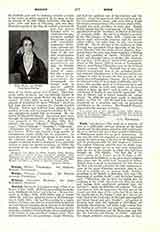

Weedall, HENRY, b. in London, September 6, 1788; d. at Oscott, November 7, 1859. Both his parents died during his early childhood; his father was a doctor. He was educated at Sedgley Park (1794-1804), and at Oscott (1804-14), and was ordained priest at Wolverhampton, April 6, 1814. He had been acting as a junior master at Oscott, and after his ordination he continued to teach classics, assisting also in the care of the Oscott mission. In the beginning of 1816 he became prefect of studies; and when Thomas Walsh (afterwards bishop of the district) became president (August, 1818), Weedall undertook the vice-presidency, taught Divinity, and had the spiritual care of lay-students and the familia. From the summer of 1821 he had been in effect the president of Oscott, and when Bishop Walsh left Oscott, on succeeding to the vicariate (April, 1826), Weedall was made president in name also. Bishop Walsh named him his vicar-general (June 14, 1828), and obtained for him the degree of Doctor of Divinity (January 27, 1829). He had been elected a member of the Old Chapter, May 8, 1827. Under his rule Oscott made noteworthy progress, and the present college edifice, two miles from the old, was erected (1836-38). On the division of the vicariates in 1840, Weedall was appointed Vicar Apostolic of the Northern District, with the titular See of Abydos; Wiseman being at the same time made coadjutor to Bishop Walsh and president of Oscott. Weedall went to Rome and obtained leave to decline the vicariate. He was then “in the desert” (head of the preparatory school at Old Oscott, 1841-3, rector at Leamington, 1843-8), until Bishop Ullathorne came to the Central District (August, 1848). Weedall was at once appointed vicar-general, dean of the cathedral church, and temporal administrator of the district and the two colleges; in 1852 he became the first provost of the newly erected Birmingham Chapter. On July 2, 1853, he returned to Oscott in its hour of difficulty, sent “to renew that peculiar spirit of ecclesiastical piety and discipline within its walls with which his character imbued it from the first”, and, in spite of almost continuous ill health, he was entirely successful. He died at Oscott, and is buried beneath the college chapel. In 1854 he had been made a domestic prelate to Pius IX. Dr. Weedall had considerable reputation as a preacher, and was an occasional contributor to the reviews. The Weedall Chantry perpetuates his memory at Oscott.
J. L. WHITFIELD

